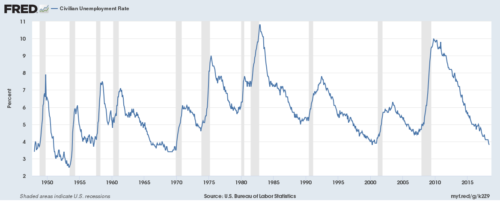Your House: Is a Bubble about to Pop in Metro Portland/Clark County? (Part Three)
Several factors have aided the housing bubble recovery both in Portland and the US at large. Jobs, interest rates, and the interaction of rent vs. purchase decisions have bolstered housing. While today they are helpful, some risk exists that these factors might turn into headwinds in the future.
-
Job Growth
Although wages have not shown dramatic growth in many areas, official unemployment rates both nationally and in the Portland area have declined to levels associated with cyclical lows.
However, jobs present a potential double-edged sword. Based on historical trends, unemployment might be as low as it gets for this economic cycle. Without further improvement in jobs and purchasing power, prior home price gains might be more difficult to sustain in the absence of economic acceleration from current rates of growth.

https://fred.stlouisfed.org/series/UNRATE
Retrieved on June 28, 2018.
https://fred.stlouisfed.org/graph/?g=ky3f
Retrieved on June 28, 2018. -
Low-Interest Rates (but Perhaps Not For Long)
Low mortgage rates have led to cheap credit and better affordability for borrowers with a clean credit history. Yet since the New Year, mortgage rates have risen to levels not seen for nearly 5 years. With the possibility for the Federal Reserve to raise interest rates further, mortgage rates could continue to rise. Rising rates could pinch housing affordability further, and, at a minimum, slow the recent pace of gains in home prices.

https://fred.stlouisfed.org/graph/?g=NUh
Retrieved on March 14, 2018. -
Renters Vs. Owners
Home prices have recovered in spite of a decline in the homeownership rate. Part of this decline has been spurred by certain borrowers being unable to access non-standard mortgage credit (subprime, Alt-A loans). Regulatory pressure and risk aversion by banks have significantly reduced the supply of non-traditional sources of mortgage credit.

https://fred.stlouisfed.org/series/RSAHORUSQ156S
Retrieved on June 28, 2018.
One factor that interests some potential homebuyers to consider owning versus renting a home is the relative price of owning versus renting. Following the bursting of the US housing bubble in 2008, prices became more affordable for owning (but only for those who could obtain mortgage credit with good credit histories or cash). However, the recent recovery in home prices has reduced the attraction of owning versus renting.
Homes in our region of Clark County, WA and Metro Portland appear a bit expensive from this perspective.
Nerd Wallet estimates that owning a home in WA or OR costs roughly 60% more than simply to rent.[1] Their analysis of the 50 states in the US revealed a range of overvaluation of buy vs. rent between 33% and 93%. For comparison, California also scored roughly 60% more expensive to buy vs. rent.
Zillow estimates that someone buying a home in Vancouver, WA will only benefit financially vs. renting after 3 years and 11 months of home ownership. This is far above the national average of 1 year and 10 months.
The home bubble has reflated in our region. Could it pop?
Think about the issues that might be more important to your family’s situation.
[1] Emily Starbuck Crone, and Daniel Tonkovich, “How Much More It Costs to Own vs. Rent in Your State”, nerdwallet on https://www.nerdwallet.com/blog/mortgages/cost-homeownership-vs-renting/?trk=nw-wire_1096_368795_26686 accessed on June 28, 2018.

